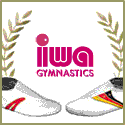Deutsch Englisch
20. August 2005
Moutier / Switzerland
Sport Aerobics
FIG Academy: A First for Aerobic
 |
|
|
On the outskirts of Paris, in the city of Eaubonne, the first ever FIG Academy of Gymnastics dealing entirely with Aerobic Gymnastics will be held August 19 – 25. Twenty candidates are in the line-up. The event is both historically and politically significant for the FIG and its President, Professor Bruno Grandi.
Following Artistic Gymnastics, the Academy integrates a second and new discipline onto the official FIG training/education programme for coaches and training personnel in competitive Aerobics.
Following Artistic Gymnastics, the Academy integrates a second and new discipline onto the official FIG training/education programme for coaches and training personnel in competitive Aerobics.
Furthermore, it reinforces President Grandi’s stand to encourage the training of coaches as a foundation for furthering the discussion of gymnast health.
Back to School for Coaches
We will recall that the FIG, in terms of developmental priorities, initiated the development of a system aimed at educating trainers called the, “Gymnastic Academies Programme”. The vision is to support the existing training programmes for coaches held by the different federations and to package the concept for developing countries.
Back to School for Coaches
We will recall that the FIG, in terms of developmental priorities, initiated the development of a system aimed at educating trainers called the, “Gymnastic Academies Programme”. The vision is to support the existing training programmes for coaches held by the different federations and to package the concept for developing countries.
The concept proposes a high priority educational system, standardised for the development of competitive gymnastics the world over. It is a system that gleans the precious knowledge offered by the fields of health and science as well as by the most recent studies on training and child development. The subjects offered include functional anatomy, educational psychology, sport theory, sport practise, nutrition, biomechanics and sport law.
A License to Teach
Teaching competitive gymnastics is a profession that leaves no room for improvisation. All issues revolve around a gymnast’s health. Having discovered certain inadequacies and shortfalls, the FIG, led by its President, took decisions that led to the establishing of the first FIG Academy in history in Kuala Lumpur in January 2002. Its objective: to educate, train and inform future coaches, eventually granting them a FIG brevet for gymnastic instruction that attests that a candidate has successfully taken the courses and examinations offered by the Academies.
Teaching competitive gymnastics is a profession that leaves no room for improvisation. All issues revolve around a gymnast’s health. Having discovered certain inadequacies and shortfalls, the FIG, led by its President, took decisions that led to the establishing of the first FIG Academy in history in Kuala Lumpur in January 2002. Its objective: to educate, train and inform future coaches, eventually granting them a FIG brevet for gymnastic instruction that attests that a candidate has successfully taken the courses and examinations offered by the Academies.
Let it be said that the “FIG Academies” project required three years of preparation and came to fruition on account of the support offered by the International Olympic Committee, Olympic Solidarity and the National Olympic Committees. It is directed by Canadian Hardy Fink, Director of Education and the FIG Academies Programme.
Source: FIG
Source: FIG












